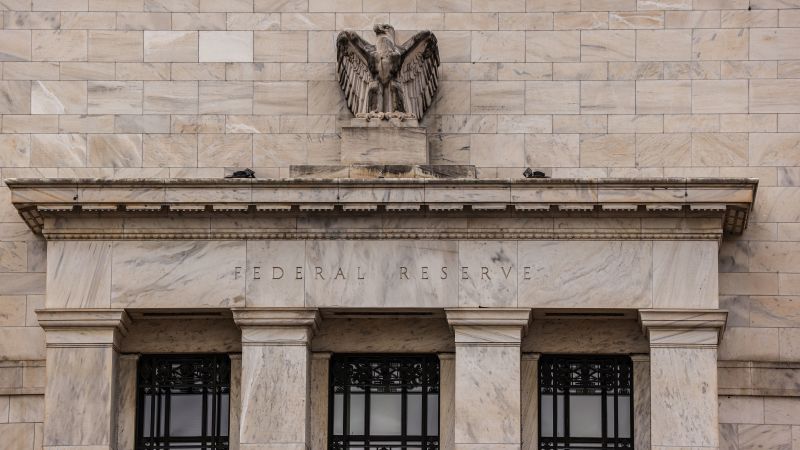The Federal Reserve announces a significant curtailment of its quantitative tightening program
Wall Street awaits Federal Reserve’s latest policy decision
New York — Wednesday’s Federal Reserve policy decision turned out to be rather unremarkable for investors as officials decided to maintain interest rates at their current levels, a decision that has remained unchanged since July 2023.
However, the Federal Reserve’s announcement of a significant curtailment of its quantitative tightening (QT) program has garnered the attention of savvy traders. Commencing in June, the Fed plans to decrease the selling of its assets as part of its QT program, aiming to decrease the money supply and raise interest rates.
The impact of this decision was immediate, as US Treasury yields underwent a drop. Yields for both the 10-year and 2-year bonds fell by 0.05 percentage points.
A brief history of QT and its impact on the economy
Quantitative tightening involves the selling of government-backed bonds by the Federal Reserve, which it had previously purchased between 2020 and 2022 to support economic recovery following the pandemic-induced recession. These purchases inadvertently led to a decrease in interest rates in specific sectors such as housing and auto sales.
However, as inflation skyrocketed in mid-2022, the Federal Reserve began unloading these bonds. At present, the Fed allows up to $60 billion in Treasuries to mature monthly without replacing them, thus decreasing the amount of money circulating in the economy. QT aims to exert downward pressure on prices.
Nevertheless, QT is not without its downsides. Altering the liquidity in the economy and redirecting money can result in significant consequences. JPMorgan Chase CEO Jamie Dimon expressed concern over the potential impact, stating in his recent annual letter to shareholders that “we have never truly experienced the full effect of quantitative tightening on this scale.” According to Dimon, the current pace of QT drains more than $900 billion in liquidity from the system on an annual basis.
In the past, the implementation of QT had negative effects on some banks, causing a “repo crisis” where overnight loan interest rates between banks spiked to unusually high levels. The Federal Reserve had to intervene by providing liquidity to restore normalcy.
Fed Chair Jerome Powell is keen to avoid a repeat of the 2019 repo crisis and had previously hinted at a forthcoming scaling back of QT measures in his press conference. Subsequently, the Federal Reserve announced on Wednesday a reduction of the rate of QT to $25 billion, more than half its current level.
Market outlook and the impact on riskier investments
The bond market anticipates significant repercussions on May 1st, stemming from the Federal Reserve’s relaxing of its tightening policy. Financial markets may perceive the tapering of the QT program as favorable for riskier investments, such as stocks and bonds, leading to potential bullish movements.
Commenting on the situation, Bill Adams, the chief economist for Comerica Bank, noted that if the Federal Reserve eases its tightening policy, “financial markets will likely see the taper of the QT program as bullish for riskier investments like stocks and bonds at the margin.”
This sentiment is grounded in the belief that a tapering of QT will cause bond prices to rise and interest rates to fall. The Bank of America analysts stated on Tuesday that the risk for stocks is skewed to the upside, especially in the event of a potential QT taper announcement.
The Biden administration plans to reclassify marijuana as a lower-risk substance
US Department of Justice recommends Schedule III classification for marijuana
In a groundbreaking move acknowledging the medical benefits of marijuana, the Biden administration aims to reclassify the long-criminalized drug as a lower-risk substance. The proposal, recommended by the US Department of Justice, suggests rescheduling marijuana to a Schedule III controlled substance, a classification currently shared by prescription drugs like ketamine and Tylenol with codeine.
“Today, [Attorney General Merrick Garland] circulated a proposal to reclassify marijuana from Schedule I to Schedule III,” stated Xochitl Hinojosa, the DOJ’s director of public affairs. The proposal will initiate a formal rulemaking process through the Federal Register, following the guidelines of the Controlled Substances Act.
Although the formal rulemaking process can be lengthy, typically involving a public comment period, the reclassification of marijuana carries far-reaching implications for cannabis-related research and the industry as a whole.
Bipartisan support for marijuana reclassification
Lawmakers from both sides of the aisle have lauded the rescheduling recommendation. Republican Representative Nancy Mace of South Carolina regarded the proposal as “major news for businesses, tax deductions & research barriers.” Similarly, Democrat Representative Earl Blumenauer of Oregon views the move as one step closer to ending the failed war on drugs.
The rescheduling recommendation suggests a shift in attitudes towards marijuana, which has gained increased recognition for its medical value. The potential reclassification has significant ramifications for the cannabis industry, paving the way for increased research and potential regulatory changes.
Founder of leading cryptocurrency exchange sentenced for money-laundering charges
Changpeng Zhao receives a four-month prison sentence
Changpeng Zhao, the founder of the world’s leading cryptocurrency exchange, Binance, has been sentenced to four months in prison after pleading guilty to money-laundering charges. This development follows last year’s revelation of Binance’s involvement in anti-money laundering activities, unlicensed money transmitting, and sanctions violations. As part of a coordinated settlement with the federal government, Binance agreed to pay fines and penalties totaling more than $4 billion.
Zhao, widely known as CZ, addressed the court prior to the sentencing hearing, expressing his remorse for the mistakes he made as CEO of Binance. He vowed that such mistakes would never be repeated.
Under the terms of the settlement, in addition to his prison sentence, Zhao, with a personal fortune of nearly $40 billion, will step down as CEO and pay $200 million in fines.


/img-s3.ilcdn.fi/eedccb892e0c2828e2a1ffa807a807d7e47fea2ba6e75350d8efeb8c60866157.jpg)